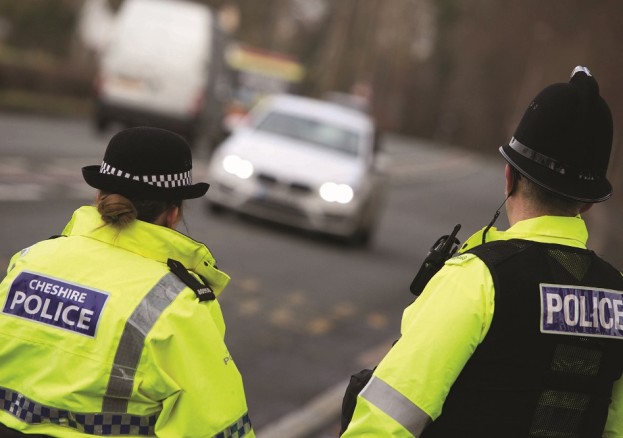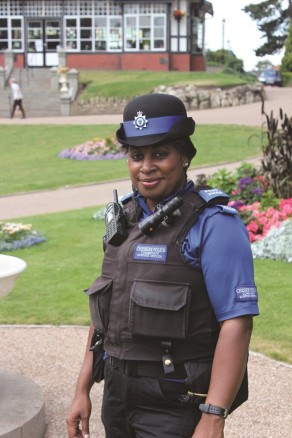
BHM: It’s really great that Cheshire Police is supporting Black History Month this year by becoming a Black History Month Diversity Champion for 2015. How important is diversity at Cheshire Police?

NB: It is so important that one of the six priorities within Cheshire’s people strategy addresses increasing the representation of protected characteristics across the force. To successfully police in Cheshire we believe that we need a workforce that reflects the diversity of Cheshire across all levels and which will bring benefits from the skills, creativity and the understanding that mix brings.
Having a diverse workforce will inevitably assist policing by building relationships within the different community groups within Cheshire, enabling us to provide a better service and make the Constabulary more accessible to those communities who may feel a bit wary of the police service as a whole entity.
The population in Cheshire has become increasingly diverse, however the recorded number of people from protected characteristics remains low, for example black and minority ethnic (BME) representation is at 3.15% compared nationally to 14%. Cheshire currently has less than 1% of officers from a BME background compared to 5% nationally and we recognise this as a key priority.
In order to address this, a three part plan has been established by Cheshire Constabulary:
Join us – striving to recruit a workforce which represents the diverse communities of Cheshire.
Stay with us – building a working environment where all staff are supported
Develop with us – empowering individuals to develop and ensure we have the mechanisms in place which allow all staff from any protected characteristic to develop to the best of their capability.
The initiatives we have put in place support our well-established staff support networks. The dedicated networks within the force are available to all staff, which actively seek to support and recruit across all strands of diversity.
You are recruiting at the moment. What vacancies do you have and what sort of people are you looking for? Do candidates have to be living in Cheshire?
NB: The police staff opportunities within Cheshire Constabulary are vast and we welcome all members of the community to come and join our police family. Police staff roles cover many areas of the organisation: finance, HR, forensics, communications, IT, investigations, vetting office, witness and victim care, and many more. Some roles include specific qualifications or equivalent relevant experience as part of their minimum eligibility criteria, so ensure you have researched the role and criteria thoroughly before you apply.
We are also constantly recruiting for the Special Constabulary. Special Constables have the same powers in law as every other police officer. You wear the same uniform, you carry the same equipment and you work alongside regular officers. You work on the same operations and alongside our partners; you will focus on problem solving local priorities. Contrary to popular belief, Specials exist, not as a substitute for the regular police, but as an important complement to the existing force and to the local community. Every Special Constable’s presence offers essential and much valued support to the regular officers. Although you won’t be paid, your training and duties will give you unique experiences, new and valuable skills, plus a tremendous sense of achievement of doing something worthwhile for your community. It is also an excellent ‘try before you buy’ opportunity for those who wish to pursue a full time career in policing. We pay expenses so you will not be out of pocket for giving your time to us.
The work of a Special Constable requires real skill and determination and the training provided will prepare you for all eventualities. You will be working as part of a team and the experiences you share by working closely together can lead to lasting friendships. You will learn more about life and human nature than most people will ever see. Some join the Special Constabulary to gain experience and skills to assist with their long term career plans to be a regular officer. Others join to give something back to the community and most stay for many years due to the satisfaction they get from the role.
Due to representation of BME staff within Cheshire being low compared to the national average, we actively encourage BME applicants from outside the county to apply for a role. Most police staff roles are based at Cheshire Constabulary headquarters in Winsford, so ideally applicants would be in comfortable commuting distance from HQ, or the LPU in which they are based. However, this does not mean that applicants need to be living within Cheshire.
Cheshire has been one of only a few forces who have had active PC and PCSO recruitment campaigns during 2014/2015 and through 2015/2016. Whilst we don’t currently have an open recruitment campaign for PC and PCSO’s, we encourage people to keep an eye on the website or email our Positive Action mailbox to establish a connection with the team. Again, potential applicants don’t have to live within Cheshire to apply.
If you apply to the force from an external area, it is imperative you research the area thoroughly especially if you are applying for a frontline role. It’s astonishing how many people apply to Cheshire, and don’t know anything about the area they are potentially going to police!
BHM: What has Cheshire Police done to embrace diversity in the last 12 months?
NB: We mentioned earlier about the People Strategy’s three-part plan to focus our efforts on achieving a workforce that is representative of the communities we serve. The ‘Join us’ aspect has been heavily addressed in the last 12 months and there has been extensive activity and initiatives put in place to try and accomplish this goal. As well as attending local colleges and university career events, the Positive Action team has visited local mosques, temples and attended various community events to promote the force as an employer. We have put on specifically targeted workshops and seminars for female and BME applicants to offer support and advice throughout the recent PC and PCSO recruitment campaigns.
The ‘Stay with us’ aspect of the People Strategy has been tackled by putting into place a ‘Buddy Scheme’ for new recruits. The scheme provides the opportunity for new recruits, particularly those with protected characteristics, who have any work related questions to have an independent contact within the force in which they can confide and find support. A buddy also acts as a point of contact to provide a better overview of Cheshire Constabulary as a place to work. The implementation of the Buddy Scheme has been seen as an effective retention tool and the promotion of a Buddy Scheme at recruitment seminars and career events has boosted interest within the organisation from potential applicants, providing reassurance that they will be supported if they are successful with their application.
The Force is also currently developing initiatives which specifically support the career development of officers and staff with protected characteristics. Having a protected characteristic won’t give an applicant an advantage in any recruitment or promotions process, the support is offered to every officer and staff member in force. However there will be additional targeted initiatives to try and address underrepresentation through the ranks and staff grades.
BHM: What advice would you give to anybody considering a career in policing?
NB: We would advise those who are interested in a career in policing to speak to a range of police officers from their local policing unit to get a perspective from them and to also speak to sergeants and possibly inspectors.
Check your local police force’s website and the Police and Crime Commissioners’ website for public forums that you can attend and listen to them, ask questions and find out what is happening in their area.
Similar to most forces, Cheshire Constabulary has a dedicated Facebook and Twitter account which is used to engage with the public about current events, operations and informs followers about any road closures or incidents. It is worth following these accounts as they also publish information about recruitment campaigns for Police Staff, officers and PCSOs.
It may also be useful to consider applying to be a Cadet or Special Constable to get an introduction to policing. Attend any recruitment seminars or workshops that are available to you for the frontline roles. It is an incredible opportunity to increase your knowledge of the role, recruitment process and ensures you get all the support you will require through what can be a challenging and rigorous process.
To apply to Cheshire (as well as an increasing number of other home office forces) as a Police Constable, you must now hold or be working towards the Certificate in Knowledge of Policing (CKP) qualification, so it’s worth researching what College of Policing (COP) accredited course providers are in your area, enquiring about what is involved in the courses, the cost and what financial options are available to you. A list of accredited CKP providers in your area is available on the COP website.
Policing is still a very demanding 24/7 job, one which you need to thoroughly research and ensure it is definitely the right career for you. It will provide you with a rewarding and varied career whether you remain as a constable or seek opportunities to get promoted.
BHM: Will you be attending any local Black History Month events?
NB: Absolutely. This year Cheshire is working alongside O.C.E.A.N, a local charity community group who provide a voice for ethnic minorities in the Cheshire East area. The group aims to reduce social isolation, enhance wellbeing in the community and encourage cohesion between all different ethnic minorities, by providing a centre for the whole community to belong and use daily. Representatives from Cheshire Constabulary have had an input in planning and will attend an O.C.E.A.N event to celebrate Black History Month on 10th October in the function room at Crewe Alexandra Stadium. The aim of the event is to celebrate the differences of the ethnic minority groups by way of exhibition, music, dance and stalls which promote the local services available for the community.
